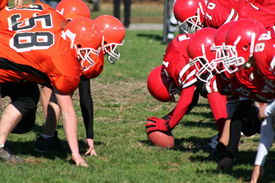A rough tackle or hit while playing your favourite sport leaves you with a bit of neck pain or muscle stiffness that fades away after a few days. You shrug it off and don’t give it any further thought. Why should you? No pain, no problem, right?
Maybe, maybe not. The tragic death of Ottawa teen rugby player Rowan Stringer stirred a much-needed dialogue on the risks of concussion in contact sports, but a concussion is not the only kind of injury to be concerned about.

Wear the proper equipment when participating in contact sports
Any direct blow to your head or shoulders can lead to disc and nerve damage, strains and sprains, and other neck injuries, that can be quite similar to whiplash in a car accident.
Whiplash doesn’t occur only in a car. It is a common term that covers a number of neck injuries that can result from any sudden impact that throws your head to the side or backwards.
Wearing the right equipment can only do so much. Whether it’s rugby or football or hockey with full gear, the neck is vulnerable.
For some people, whiplash leaves them with only a few days of mild pain that can be treated conservatively. But in the more severe cases, it can result in permanent conditions such as chronic pain, temporomandibular joint dysfunction (TMJ), etc.
Watch for the warning signs
So next time you find yourself ploughing a furrow at the 50-yard line, look for the warning signs that may be immediately present, or develop over the next few days following the game.
Neck and/or shoulder pain are the most obvious symptoms. But watch as well for headaches, neck swelling, muscle spasms, numbness or tingling in your arms, nausea, difficulty swallowing, dizziness, and blurred vision.
Weigh your risks
Wearing shoulder pads, a helmet, and a mouth guard can reduce the risk of these neck injuries, but nothing can eliminate it. It’s up to you to decide how rough of a sport you want to play. And use your common sense – don’t do things that are high risk, like crashing helmet to helmet with another player.
Consider too your state of health and whether you already have a history of neck pain. A healthy neck with proper alignment is less prone to injury than one in need of chiropractic care. Perhaps you just shouldn’t be engaging in a given activity.
And don’t forget the basics:
- Always warm up and stretch before the activity, with focus on the neck and shoulders.
- If you’re overtired and less alert, maybe you should sit it out that day.
We can help
Chiropractors are, after all, primary care providers who specialize in spinal health – this includes your neck. We can diagnose and help with many of the sports-related injuries that involve the neck and spine, and work in conjunction with any other qualified healthcare providers who may be required given your situation, such as physiotherapists.
